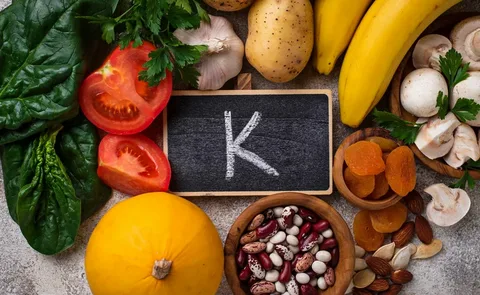Vitamin K is an essential nutrient that plays a crucial role in various bodily functions, particularly in bone health. This guide explores the importance of vitamin K, its benefits for bone health, sources, recommended intake, and answers to frequently asked questions.
Understanding Vitamin K
What is Vitamin K?
Vitamin K is a fat-soluble vitamin that is essential for the body. It exists in two main forms: vitamin K1 (phylloquinone) and vitamin K2 (menaquinone). Vitamin K1 is found primarily in green leafy vegetables, while vitamin K2 is found in animal products and fermented foods.
Types of Vitamin K
- Vitamin K1 (Phylloquinone): Found in green leafy vegetables like kale, spinach, and broccoli. It is the primary source of vitamin K in the diet.
- Vitamin K2 (Menaquinone): Found in animal products and fermented foods. It has several subtypes, including MK-4 and MK-7, which are known for their role in bone health.
The Role of Vitamin K in Bone Health
Bone Mineralization
Vitamin K is essential for bone mineralization, a process where minerals are deposited in the bone matrix to give bones their strength and rigidity. It activates proteins that bind calcium to the bone, ensuring proper bone formation and maintenance.
Osteocalcin Activation
Osteocalcin is a protein produced by osteoblasts (bone-forming cells). Vitamin K is required for the carboxylation of osteocalcin, which allows it to bind calcium effectively. Without sufficient vitamin K, osteocalcin remains inactive, impairing bone mineralization.
Inhibition of Bone Resorption
Vitamin K helps regulate bone remodeling by inhibiting bone resorption, the process where old bone is broken down and removed. This balance between bone formation and resorption is crucial for maintaining bone density and strength.
Sources of Vitamin K
Dietary Sources
- Green Leafy Vegetables: Kale, spinach, broccoli, Brussels sprouts.
- Fermented Foods: Natto, sauerkraut, fermented dairy products.
- Animal Products: Meat, cheese, eggs.
Supplements
Vitamin K supplements are available in various forms, including vitamin K1 and K2. Consult with a healthcare provider before starting any supplementation to ensure it meets your specific needs.
Recommended Intake
Daily Requirements
The recommended daily intake of vitamin K varies by age, gender, and life stage. The general guidelines are:
- Adults: 90-120 micrograms (mcg) per day
- Children and Adolescents: 30-75 mcg per day, depending on age
Health Benefits Beyond Bone Health
Cardiovascular Health
Vitamin K plays a role in preventing arterial calcification, which can lead to cardiovascular diseases. It helps maintain the elasticity of blood vessels by preventing the deposition of calcium in arterial walls.
Blood Clotting
Vitamin K is well-known for its role in blood clotting. It activates proteins required for the coagulation process, preventing excessive bleeding in case of injury.
Vitamin K Deficiency
Causes of Deficiency
- Poor dietary intake
- Malabsorption disorders (e.g., celiac disease, Crohn’s disease)
- Certain medications (e.g., anticoagulants, antibiotics)
- Liver diseases
Symptoms of Deficiency
- Easy bruising
- Excessive bleeding from wounds
- Nosebleeds
- Heavy menstrual periods
FAQs
How does vitamin K contribute to bone health?
Vitamin K is essential for activating osteocalcin, a protein that binds calcium to the bone matrix, promoting bone mineralization and strength.
Can I get enough vitamin K from my diet alone?
Yes, a balanced diet rich in green leafy vegetables, fermented foods, and animal products can provide adequate vitamin K. However, some individuals may require supplements based on their health needs.
Are there any risks associated with vitamin K supplementation?
Vitamin K supplements are generally safe when taken as directed. However, excessive intake may interfere with anticoagulant medications. Consult with a healthcare provider before starting supplementation.
How does vitamin K interact with other vitamins and minerals?
Vitamin K works synergistically with vitamin D and calcium to promote bone health. It helps direct calcium to the bones and away from arteries and other soft tissues.
What are the best food sources of vitamin K?
Green leafy vegetables (e.g., kale, spinach, broccoli), fermented foods (e.g., natto, sauerkraut), and animal products (e.g., meat, cheese, eggs) are excellent sources of vitamin K.
Can vitamin K help prevent osteoporosis?
Vitamin K supports bone health by promoting bone mineralization and reducing bone resorption. Adequate intake may help prevent osteoporosis, especially in postmenopausal women.
How much vitamin K do I need daily?
The recommended daily intake varies by age and gender. Adults typically need 90-120 micrograms per day, while children and adolescents require 30-75 micrograms per day.
What are the symptoms of vitamin K deficiency?
Symptoms of deficiency include easy bruising, excessive bleeding, nosebleeds, and heavy menstrual periods. Severe deficiency can lead to hemorrhagic conditions.
Can I take vitamin K with blood thinners?
Individuals taking blood thinners should consult with their healthcare provider before taking vitamin K supplements, as it can interfere with the medication’s effectiveness.
How does vitamin K benefit cardiovascular health?
Vitamin K helps prevent arterial calcification, maintaining the elasticity of blood vessels and reducing the risk of cardiovascular diseases.
Conclusion
Vitamin K is vital for maintaining bone health, supporting cardiovascular health, and ensuring proper blood clotting. Adequate intake through diet and, if necessary, supplements can help prevent deficiency and promote overall well-being. Incorporating vitamin K-rich foods into your diet is a simple and effective way to support your bone health and overall health.
- What Is Sapiosexuality And How It Shapes Attraction In The Digital Age? - June 1, 2025
- Profhilo Treatment Near Okewood, Surrey - May 31, 2025
- The Emotional Journey Of Being In A Pansexual Relationship - May 30, 2025

